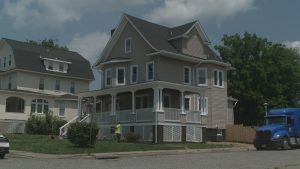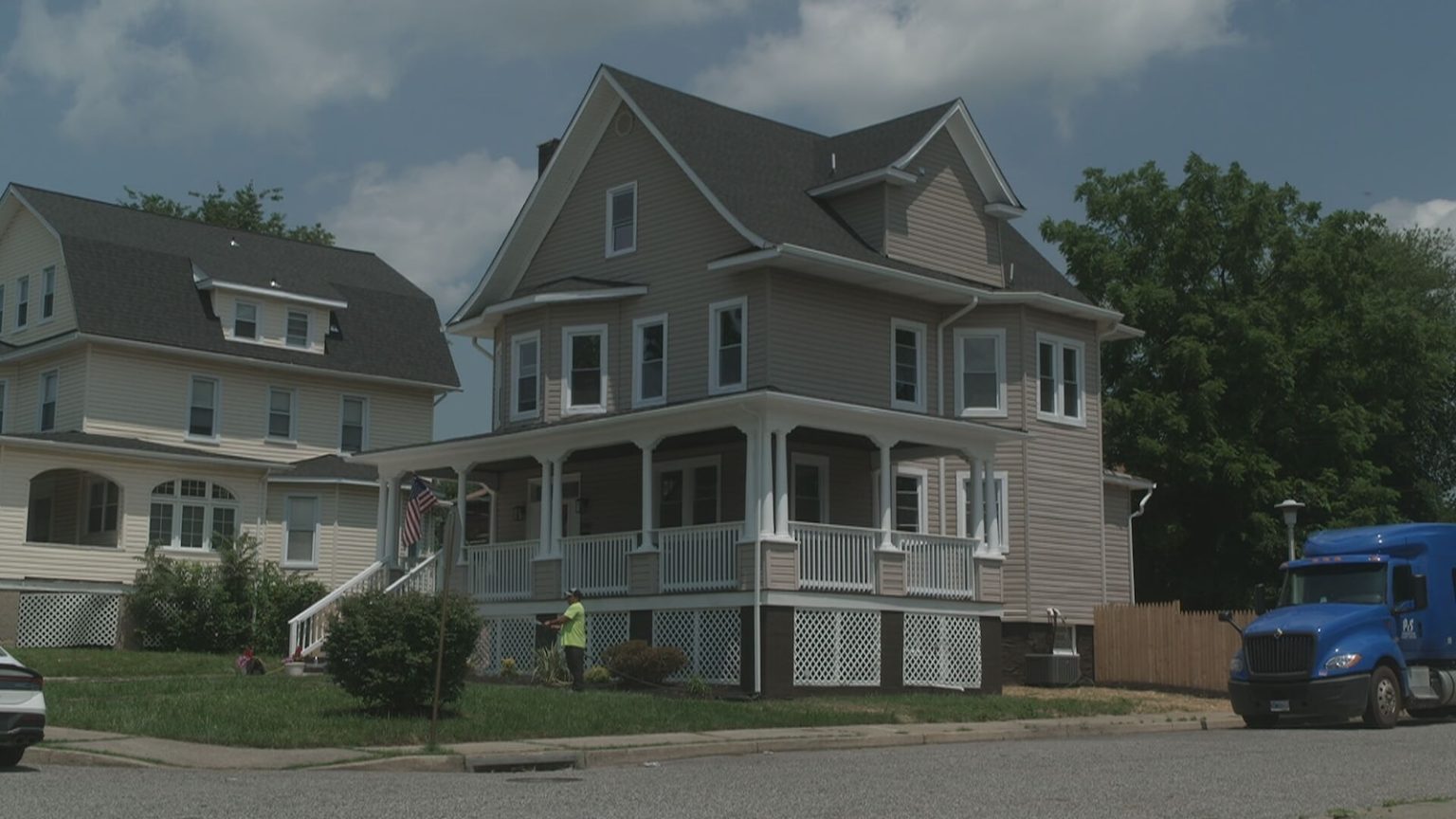Bonita Anderson’s favorite part of living in Baltimore is having family nearby. A family matriarch with five children and eight grandchildren, Anderson worked hard to buy a place in the city for her family to call home in 2009.
“It was an accomplishment for me,” she said. “That’s where we used to gather to bring the family together.”
Last week, what was once Anderson’s cherished home was listed for sale at nearly $540,000 — more than five times what she paid for it. But Anderson won’t see any of the proceeds.
After more than a decade of making payments toward her $100,000 mortgage, Anderson was diagnosed with cancer in 2020. Amid mounting medical bills and property taxes, the lifelong Baltimore resident says she had to choose between fighting for her life and fighting for her home.
While undergoing treatment, Anderson fell behind on her property taxes by about $5,000. In 2022, she lost her house at a Baltimore City tax sale.
“I sat down and thought, ‘Oh my god, I’m 70 years old and I’m homeless,'” Anderson told ABC News Senior Political Correspondent Rachel Scott.
The City of Baltimore had put a lien on Anderson’s tax debt and auctioned it off to the highest bidder — a company that specializes in tax lien purchases — for just $69,500.
Bonita Anderson used to live in this house in Baltimore.
ABC News
“If you can’t afford to pay your property taxes and you keep missing your payments, government is going to auction your property off for back taxes,” said Lawrence Levy, executive dean at the National Center for Suburban Studies at Hofstra University.
Court records show Anderson tried to make good and redeem her home, paying the city $18,900 by the end of 2022 — more than triple her outstanding taxes. But instead of putting these payments toward her back taxes, the city applied the money to taxes that had accrued under the new owner.
Anderson was unknowingly paying the investor’s tax bills instead of her own, allowing the company to foreclose on her home in 2023.
“I was just baffled,” she said.
‘Filled with distortions’
Anderson’s home was just one of nearly 44,000 Baltimore properties that were listed at municipal tax sales from 2019 through 2023. It was also among the 92% of those properties located in majority-nonwhite neighborhoods — which account for 70% of parcels citywide.
An analysis of ATTOM and U.S. Census Bureau data by ABC Owned Television Stations showed one likely reason for this disparity: disproportionate property taxes.
Property taxes are based on a government assessment of each home’s value. But researchers say property values are highly subjective, and these estimates don’t always align with market prices.
Data shows discrepancies in assessments — and therefore tax bills — affect some communities more than others.
ABC’s analysis found that across the country, homeowners in predominantly Black and Brown areas tend to pay higher taxes than those in mostly white neighborhoods for a house worth the same amount on the open market.
“When property tax systems are filled with distortions the people punished tend to be the poorest homeowners,” Levy said. “In suburbia, where you have a high level of segregation, the people who are being taxed unfairly based on not accurately capturing the value of the home are people of color.”
Lawrence Levy is the executive dean at the National Center for Suburban Studies at Hofstra University on New York’s Long Island.
ABC News
For some of these homeowners who are “highballed” on their assessments, missed bills lead to tax sales, leaving them with nothing. From the time Anderson bought her home until she lost it, the property’s assessment more than tripled — but the home’s booming value ultimately went to its new owner.
“I don’t know what’s worse, losing the house or being diagnosed with cancer,” Anderson said. “It hurts still.”
Until recently, Levy noted, tax sales most often took place in cities. As urban neighborhoods gentrified and property values shifted rapidly, longtime residents couldn’t always keep up with rising bills.
“We’re now starting to see more of that in suburban areas, particularly in the poorer suburban areas as we’re seeing demographic change,” Levy said.
In Garden City, a predominantly white suburb on New York’s Long Island with a median home value of around $1 million, a typical residential tax bill is around $10,000 to $15,000, property data shows.
Down the road in Hempstead, where 88% of residents are Black or Latino, homes tend to be worth less than half that. But the typical tax bill is similar, meaning Hempstead homeowners pay proportionally more in taxes relative to the value of their homes.
John Rao, senior attorney at the National Consumer Law Center, says U.S. homeowners in communities of color face a “double whammy.” They often receive “lowballed” appraisals when trying to purchase or refinance their homes, Rao explained, “but when it comes to paying their taxes, once they’ve owned the home … often their assessments are proportionally higher than what they should be.”
‘Stripping generational wealth’
In suburban Delaware County, Pennsylvania, 91-year-old Gloria Gaynor, who suffers from dementia, lost her home of 25 years because of $3,500 in taxes she didn’t pay during the COVID-19 pandemic.
Gaynor’s daughter, Jackie Davis, told ABC station WPVI-TV that her mother stayed home during the pandemic. She skipped her annual trip to the tax office after hearing that tax collectors had paused enforcement as COVID-19 spread through the Philadelphia suburbs.
When the government restarted collection efforts and the county tax office reopened, Gaynor went in and made a payment, intending to cover her previous year’s taxes, according to her attorney, Alexander Barth.
Instead, the money was applied to Gaynor’s 2021 and 2022 taxes and not her outstanding balance from 2020, “leaving what is essentially a donut in her tax payment history,” Barth explained.
Jackie Davis is seen caring for her 91-year-old mother, Gloria Gaynor.
WPVI
A real estate investor bought Gaynor’s home from Delaware County for $14,000, the cost of her overdue taxes plus interest and fees.
Gaynor had paid off most of her mortgage on the house, which is now worth an estimated $247,000. But she did not make any money from the sale.
“This is stripping generational wealth from the have-nots and allowing the haves to have it,” Barth said.
Gaynor’s family went to court in an attempt to get back her home, but two courts upheld the sale.
The Delaware County Tax Claim Bureau told ABC’s Philadelphia station that while it “sympathizes with the emotional toll” on Gaynor, the county government acted within Pennsylvania law and issued multiple notices ahead of the sale.
If Gaynor had lived just a few miles away inside Philadelphia’s city limits, officials there would have taken extra steps to try to keep her in her home.
Since property taxes are handled differently in different communities, some local governments like Philadelphia have layers of protection for vulnerable homeowners, such as requiring in-person notifications before a tax sale or offering payment plans to redeem a home afterward.
“Although local governments should do everything they can to keep people in their homes, whether it’s an owner or a renter, at some point they have an obligation to all the other taxpayers, the businesses, the families that are paying their fair share to make sure that these taxes are collected,” Levy said.
From the living room to the courtroom
Just over 90 miles down the road from Gaynor, Anderson spends her days looking back on the memories she built in the home that was once the centerpiece of her family.
Now living with her daughter in a Baltimore suburb, Anderson has taken her case to court, joining a lawsuit claiming that the City of Baltimore broke federal law by selling her former home to a private company for pennies on the dollar.
The City of Baltimore, which did not respond to ABC News’ requests for comment, has defended its actions in court, saying it notified Anderson as required and did not profit from the sale.
In 2023, the U.S. Supreme Court ruled that local governments could not profit from tax sales, finding that homeowners have a constitutional right to any payments beyond the taxes and penalties they owe.
Over the last two years, many states across the country have changed their laws in light of the court’s decision. But some experts say the federal government also has a role to play.
Bonita Anderson (left) told ABC News Senior Political Correspondent Rachel Scott that she was “baffled” by the loss of her Baltimore home.
ABC News
“The federal answer to lower local property taxes is more funding for local services,” Levy said. “They need more help from Congress and the White House.”
As the Trump administration has slashed the federal budget, local governments will have to make up the difference to provide the same services.
According to experts, municipalities will likely rely more on property taxes, which in turn, could mean more situations like Anderson’s, where homeowners in majority-nonwhite neighborhoods too often pay more than their fair share.
When asked by ABC News what happened to her dream of passing down her home to the next generation of her family, Anderson said, “it died.”
“It still makes me emotional,” Anderson said. “It’s just hard. Very hard.”
ABC News’ Meghan Mistry, John Santucci and Lucien Bruggeman along with ABC Owned Television Stations’ Ryann Jones, Maggie Green, Jason Knowles, Cheryl Mettendorf, Chad Pradelli, Dan Krauth, David Paredes, Ross Weidner and Sarah Rafique contributed to this report.



